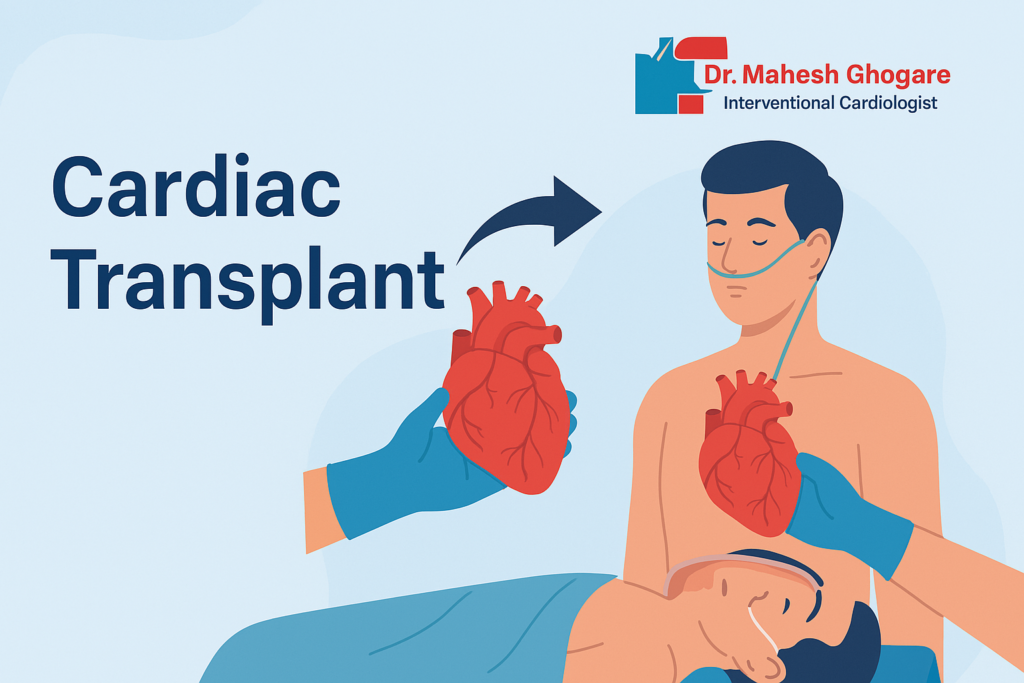Heart transplant or Cardiac transplant is a surgery in which a patient with a diseased or damaged heart has it replaced through surgery with a healthy donor heart. This is done when the most serious of conditions occur with the patient and even lifestyle changes, medications and less invasive procedures have not worked or the patient.
The patient’s medical condition is thoroughly checked before he undergoes surgery to determine if the patient is suitable to undergo a transplantation surgery. The most general cases of people who have received heart transplantation surgery are those who have experienced heart failure due to reasons such as insufficient blood being pumped by the heart, electrical conduction system of the heart malfunctioning which is responsible for determining the heart rate, rhythm and sequence of contraction of the heart muscle, coronary artery disease, valve dysfunction, congenital defect or a weakened heart muscle known as Cardiomyopathy.

Understanding Cardiac Transplant – The Basics
A cardiac transplant is a life-saving surgical intervention for patients suffering from irreversible heart conditions. It involves the removal of a damaged heart and replacing it with a healthy one from a deceased donor.
Key Terms:
- End-stage heart failure: A condition where the heart can no longer pump blood effectively.
- Donor heart: A heart retrieved from a recently deceased individual who had consented to organ donation.
- Immunosuppressants: Medications given to prevent the body from rejecting the new heart.
In some cases, before a heart transplant is considered, less invasive procedures such as Coronary Angioplast are performed to improve blood flow to the heart.
Causes and Symptoms That Lead to Cardiac Transplant
Causes That May Lead to Heart Transplant:
- Dilated Cardiomyopathy – The heart chambers enlarge and weaken.
- Ischemic Heart Disease – Result of blocked arteries leading to heart failure.
- Congenital Heart Disease – Birth defects affecting the heart’s structure.
- Valvular Heart Disease – Damaged heart valves impair blood flow.
- Refractory Arrhythmias – Life-threatening abnormal heart rhythms not controlled by treatment.
Symptoms of End-Stage Heart Failure:
- Persistent shortness of breath
- Fatigue and weakness, even during rest
- Swelling in legs, ankles, and abdomen (edema)
- Rapid or irregular heartbeat
- Frequent hospitalizations for heart failure
Expert Insights & Tips for Transplant Patients
Life After a Heart Transplant:
- Medication Adherence: Taking immunosuppressants exactly as prescribed is crucial to prevent organ rejection.
- Healthy Lifestyle: A balanced diet, no smoking or alcohol, and regular exercise (under guidance) are essential.
- Regular Monitoring: Routine biopsies, blood tests, and imaging are performed to monitor heart function and detect early signs of rejection.
- Mental Health Support: Many patients experience emotional changes after transplant; counseling or support groups can be helpful.
Expert Advice:
- Stay Positive but Realistic: Transplant is not a cure but a new lease on life that requires lifelong care.
- Communicate Openly with Doctors: Share any side effects or symptoms without delay.
- Stay Informed: Keep learning about your condition and be actively involved in your treatment plan.
About Dr. Mahesh Ghogare
Dr. Mahesh Ghogare has done his super specialization (DM Cardiology) in adult and pediatric cardiology from LTMMC and LTMGH, Sion Hospital, Mumbai. After that, he worked as Asst. Professor in the Department of Cardiology. Later, he joined the Seven Hills Hospital Health City, Andheri, where he mastered coronary angiographies and angioplasties through the radial route, a highly skilled technique. There, he has performed more than 3000 angiographies and over 500 angioplasties, mostly through the radial route.



